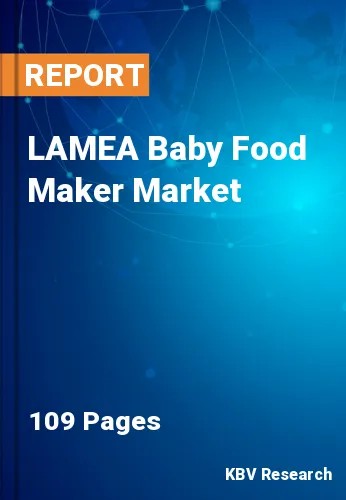The Latin America, Middle East and Africa Baby Food Maker Market would witness market growth of 12.8% CAGR during the forecast period (2024-2031). In the year 2027, the LAMEA market's volume is expected to surge to 255.3 Thousand Units, showcasing a growth of 10.9% (2024-2031).
The online distribution channel has revolutionized the baby food maker market by providing parents with a convenient and efficient shopping experience. E-commerce platforms allow consumers to browse a vast selection of products from various brands, compare prices, read customer reviews, and access detailed product descriptions—all from the comfort of their homes. Thus, the online segment in Brazil market consumed a volume of 18.91 Thousand Units in 2023.

The Brazil market dominated the LAMEA Baby Food Maker Market by Country in 2023, and would continue to be a dominant market till 2031; thereby, achieving a market value of $41.1 million by 2031. The Argentina market is showcasing a CAGR of 13.6% during (2024 - 2031). Additionally, The UAE market would register a CAGR of 11.9% during (2024 - 2031).
Modern kitchen designs often incorporate advanced appliances, and make them fit seamlessly into this setup. Their sleek designs and multifunctional capabilities make them a desirable addition to contemporary kitchens, promoting their adoption. Positive reviews and word-of-mouth recommendations from other parents play a significant role in adopting them. Satisfied users who share their experiences with these devices influence other parents to make similar purchases.
Key trends shaping its growth and development influence this market. Consumers are demanding greater transparency and traceability in food production. This trend extends to baby food, with parents wanting to know the origins and quality of the ingredients in their baby’s diet. They allow parents complete control over the preparation process, ensuring transparency and traceability from farm to table.
In Brazil, the IBGE reported a 2.5% increase in retail trade sales between December 2023 and January 2024, with a notable 4.1% rise compared to last year. This retail sales growth indicates a recovering economy and heightened consumer confidence, creating a favourable environment for this market. Brazilian consumers are more inclined to invest in innovative, high-quality products for their families as they experience increased financial stability. The trend toward healthier eating and the growing interest in homemade baby food positions these are as essential kitchen appliances for many households. Retailers in Brazil are likely to respond to this demand by increasing the availability of various baby food makers, catering to diverse consumer preferences. In conclusion, the LAMEA region is seeing growth in this market driven by higher female labour force participation, increasing disposable income, and expanding retail sectors. These factors foster significant market expansion.
Free Valuable Insights: The Worldwide Baby Food Maker Market is Projected to reach USD 2.2 Billion by 2031, at a CAGR of 11.1%
Based on Product, the market is segmented into Food Preparation, and Bottle Preparation. Based on Distribution Channel, the market is segmented into Hypermarkets & Supermarkets, Online, Specialty Stores, Convenience Stores, and Other Distribution Channels. Based on countries, the market is segmented into Brazil, Argentina, UAE, Saudi Arabia, South Africa, Nigeria, and Rest of LAMEA.
By Product (Volume, Thousand Units, USD Billion, 2020-2031)
By Distribution Channel (Volume, Thousand Units, USD Billion, 2020-2031)
By Country (Volume, Thousand Units, USD Billion, 2020-2031)
Our team of dedicated experts can provide you with attractive expansion opportunities for your business.

